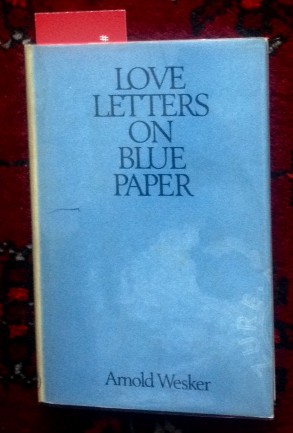Inspiring Older Readers
 posted on 09 Aug 2016
posted on 09 Aug 2016
Love Letters On Blue Paper by Arnold Wesker
The great Arnold Wesker died in April of this year and future readers will almost certainly get to know his work as a dramatist rather than as a prose writer. This is entirely right, of course, because his early trilogy of working class life – especially Jewish working class life – is a classic. Chicken Soup With Barley (1958), Roots (1959) and I’m Talking About Jerusalem (1960) deals with issues such as anti-fascism, feminism and early examples of green ecology and these are issues that kept surfacing in Wesker’s plays in one form or another.
Wesker’s obituary written by Julia Pascal in April 2016 in The Guardian refers to him as an ‘optimistic’ Socialist which is a label that might fit neatly with the plays and with his social campaigning but you might find it hard to sustain this view if you turn to his small collection of short stories, Love Letters On Blue Paper. Wesker didn’t do that much writing in prose – although there is a small body of fiction and non-fiction and quite a substantial autobiography – and this collection is relatively small and often optimism is hard to find. However, the jewel in the crown here is the title story which he also adapted as a play and which is extraordinarily poignant.
The three short stories here are all concerned with disappointment, loss and death. The Man Who Became Afraid is, perhaps, the most gloomy of this collection. This is the tale of Sheridan Brewster who, after spending his time as a young man travelling and getting ‘involved’, marries unwisely, has children and settles into an ‘increasingly melancholy life in the protective bosom of his local Greenwich Labour Party and the, by now, rejecting bosom of a wife whose weary astringency had once excited him to marriage’. Brewster at first affects a fear of the outside world, of being misunderstood and cultivating relationships as an excuse for everything he can’t accommodate but slowly and without acknowledging it he slides into a real and tangible fear of life – an existential doubt and terror – and the only person he has to turn to is his cold and alienated wife.
In the second tale, the very short A Time of Dying, a Jewish family deals with the co-incidence of the sudden deaths of several older relatives and the imminent passing of another. The story deals with inter-generational relationships and how the joy of life, the need to live, is imparted by making connection.
But, I think, the book steps up a level with the final story, Love Letters On Blue Paper. Victor is a national trade union leader who is ill in bed having been diagnosed with a terminal cancer of the blood but he keeps this information from his wife Sonia, telling her instead that his illness is related to high blood pressure. He shares the truth with a friend, Maurice, on whose visits he becomes increasingly dependent. Maurice struggles with the implication of being a third party and keeping secrets – a role he finds difficult to reconcile in part because of Sonia’s evident resentment of his privileged access to Victor. Then, one day, Victor shows him a letter he has received, written on blue paper, and clearly from Sonia. This is the first of a series that documents Sonia’s love for Victor and how she has come to feel about life with him – and the prospect of death. Their inability to talk to each other, to explore the fear, is overcome by these love letters on blue paper and in the end Sonia’s words give Victor the permission to let go of a life he is trying to cling to with increasing desperation:
“There will be, my darling one, I know it, a blinding light, a painful light when suddenly the lie will fall away from the truth. Everything will make its own and lovely sense, trust me trust me........”
It is a sad but elegiac piece of writing but full of Wesker’s humanity and his concern with how best to confront eternity. Truly a beautiful short story, that was adapted for the stage as well, would stand comparison with the very best writers of the form and which, for me at least, gives Wesker a dimension beyond that of a great playwright.
Terry Potter
August 2016